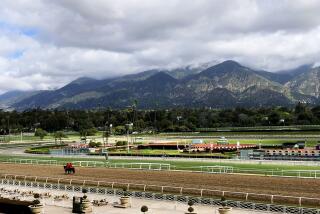Real Engine of Commerce
- Share via
It’s high noon at Nationwide Auction Systems in city of Industry, and they’re bringing in the big guns. Puffs of burning transmission fluid mingle with cigar smoke and hamburger fumes all wafting from their respective corners of the auction yard. Regular bidding is interrupted for a series of special cars now revving their engines at one side of the auto strip. A 1998 Oldsmobile Aurora pulls into the curved arena. Someone in the stands gives it a wolf whistle.
From the podium perched in the center, brother auctioneers Mike and Ron Hoch begin the bidding. The pace is rapid-fire. It takes a trained ear to decipher their auditory equivalent of fine print in which details about the car--its mileage, any extra fees, and the status of its title--are reduced to “hubidahubidahubida.”
“Hubidahubidahubida, do I hear 30,000?” In the pit, six “ring men” search the benches for signals. It’s clear the crowd of a couple hundred won’t bite. The opening bid is a low-ball $5,000 and the ring men leap into action like fight dogs. Chomping on gum, whipping their arms around, barking out numbers, they fire bid confirmations back to the Hochs. Two bidders quickly rally with a series of hand raisings and head nods, until a number sticks.
“Sold! For seventeen-five,” announces Hoch. Several onlookers nod their heads with approval. The winning bidder, who asked to remain anonymous, is ebullient, although he wonders aloud whether the other bidder was a phantom. “It happens so fast, it almost feels like you’re bidding against yourself,” he said. Regardless, he got a good deal. He was prepared to pay $22,000. “It’s worth $30K wholesale,” he says. In addition to the final bid price, winners are responsible for a $45 processing fee, $50 smog check plus $8.25 for the certificate and a 10% to 20% buyer premium.
“You can double your money on a car like that,” says auction expert Jackson Chaker. Chaker produces “Auction World,” a cable-access TV show, and has written nine books on auctions, which he sells at a booth by the entrance alongside the seriously important Kelley Blue Book.
*
It’s a fine line between a bargain and heartbreak in the auction world. The Blue Book, which provides the current resale value of more than 10,000 models of cars, trucks and vans, is the second-most important instrument of protection. No. 1 is a close personal mechanic friend.
Nearly 700 castaway and confiscated automobiles, motorcycles, even firetrucks, will compete for the bids of today’s intent crowd. The cars come from cities, counties, repossessions companies, charities, Southern California Edison, the U.S. marshals and beyond. Every car will find a new home, even the Hostess Twinkie truck, with one of the bidders--immigrant cabdrivers, independent contractors, used-car salesmen, bottle blonds, Armenian hipsters, goosey teens and others who have come to try their luck and dodge the lemons.
“Don’t get caught up in the emotion,” advises Larry Andre, a masonry contractor here specifically for lot No. 72, a Chevy diesel truck he needs for business. He shakes his head at a family going for a Dodge Neon. “Thirty-two hundred dollars? They just paid too much.”
“You’re playing with danger here,” says Samuel Guillen, a business analyst from Downey. “When you set your limit, stick to it.” Guillen recommends attending the preview one day prior to the auction. Driving preview cars is prohibited, but you can turn them on, check the miles and kick the tires. If you’re lucky, you may find the previous owner’s name in the glove compartment and make a few calls to check its history. But no amount of sleuthing will ensure you get a good car. It is always a gamble.
“There is a high degree of failure and a high degree of success too,” says Chaker. “You can make $100,000 a year turning cars around. It’s a very lucrative business.” Chaker has bought 26 cars in the last five years, one of them a 1978 Rolls-Royce Silver Shadow snatched up for $8,500. Successes like this are what fuel the $76.5-billion auction industry.
With more than 300 auctions, including real estate and personal property auctions, in Southern California every week, there is plenty of opportunity to win or lose. “But the nature of the beast is risk,” Chaker says. Other Los Angeles car auctions include Spectrum Auction Co., which specializes in vintage cars, and Insurance Auto Auctions, which handles vehicles that have been in accidents, though it sells primarily to dealers.
*
George Sack Jr.’s middle name would be “risk” if that space weren’t already taken up by “The Jackknife King.” He’s a familiar face at Nationwide, having spent $250,000 here in the last two months alone. Sack, a stunt driver for such films as “The Mexican” and “Three Kings,” and his son, George Sack IV, have seats in the bleachers. Their first buy today is one of the many Ford Crown Victorias--discarded police cars with tell-tale saddle-shoe paint jobs, which he plans to use as a scarecrow of sorts.
“I’m going to put [a light bar on top with a remote control and park it at the driveway of my friend’s mansion,” to ward off thieves, he explains. He picks up a Ford school bus for a movie shooting in Compton, and the rest he’ll resell. Turnarounds are the jackpot of auctions. Sack’s biggest bonanza was a pavement-profiler machine he purchased at auction for $900 and sold for $80,000. Today, Sack will walk away with $62,432 in equipment, which he will resell at his Agua Dulce truck shop.
Guillen admires the Jackknife King. “People like him are extraordinary. The majority of people here are average citizens looking for passenger vehicles,” he says. “But you can get extraordinary deals, no doubt about that.”
*
More information on auto auctions can be found online at https://www.co.la.ca.us/citguide/citizens.htm.






